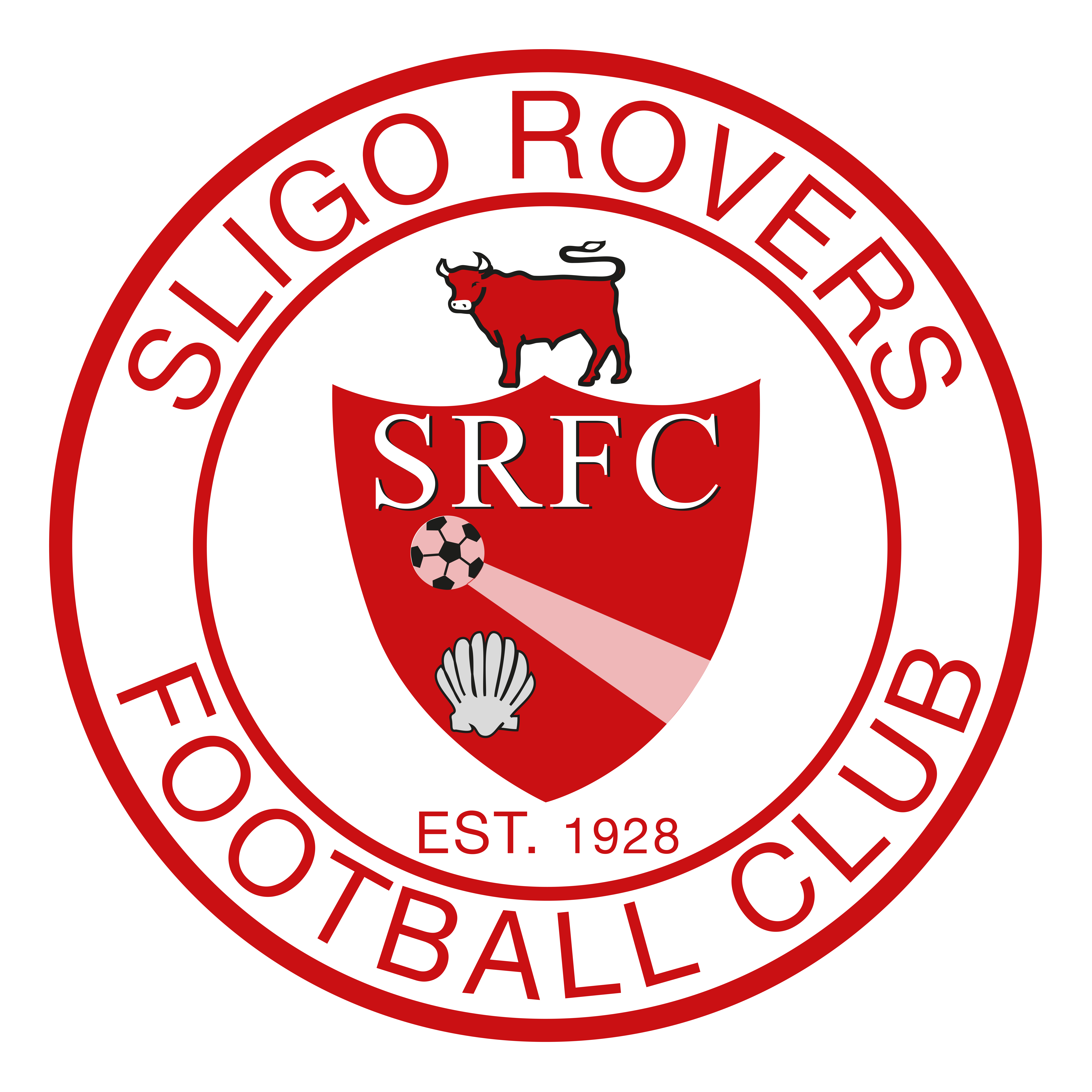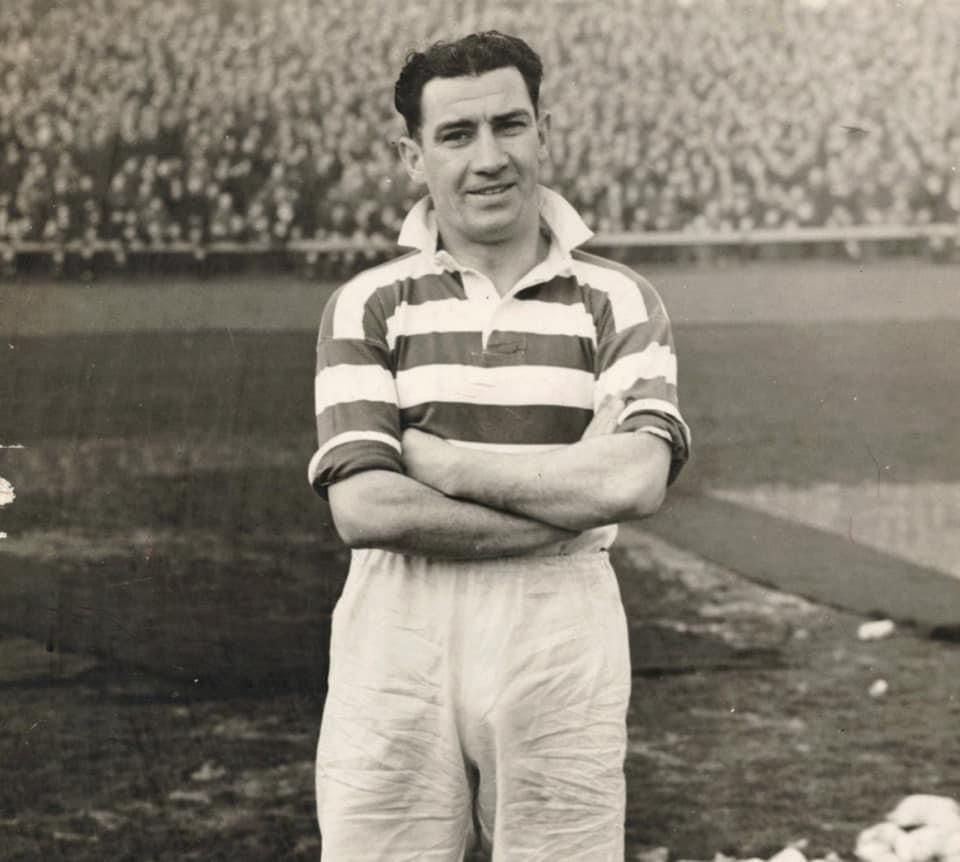By Jim Gray
Deep in untamed woodlands nestling high above Sligo’s sacred Tobarnalt Holy Well, camouflaged amongst a thicket of tangled briers and sharp-thorned brambles, rests a 10” plaque bearing the name of Sean Fallon. The only person who knows its location and its significance is the man who put it there, Fallon’s only son, Sean T.
In a gesture graphically illustrating his late father’s indelible connection with his birthplace, Fallon Junior brought the plaque, which had been used as a temporary monument on his father’s grave in Glasgow, to the place he knew his dad would most like to be remembered.
As a child, he was brought to this holy place by his father every summer. Far from the fame of Glasgow Celtic’s “Iron Man” status, Sean Fallon would come here with his young family, unknown and unfettered, to touch base with a tradition he’d learned as a young boy growing up in St. Anne’s Terrace on the banks of the Garavogue River.
Now, months after his death in 2013, his son was back on familiar turf. He climbed slippery rocks, battled his way through thick, prickly shrubs and gorse, found an isolated patch and, with hands torn and scratched from the effort, placed the nameplate in its new home.
“For me, it’s his homecoming. I just wanted to signify his love of Sligo and of the Holy Well in particular,” Fallon junior explains.
It’s but one of many engrossing stories which illuminate the larger-than-life character of a genuine Sligo legend – a man from a humble working-class background who went on to become an iconic figure at Glasgow Celtic Football Club; who helped discover, nurture and construct the immortal Lisbon Lions, a team named after the city in which Celtic became the first British team to win the European Cup in 1967; whose unerring eye for raw potential unearthed further generations of International footballers; who travelled the world as a football ambassador, uniquely playing for both the Republic of Ireland and a Northern Ireland representative team; who counted luminaries such as Alex Ferguson and Sean Connery as close personal friends; but who was never more at home than playing a round of golf at Rosses Point or kneeling in prayer at the Holy Well.
Sean Fallon’s astonishing football exploits are well documented. He is revered in his adopted city of Glasgow and he is honoured with two separate football pitches named after him in his native town, the county council owned pitch at Cranmore and the Sligo Rovers Astro turf facility at the Showgrounds, which fittingly serves as the home venue and training facility for the club’s academy teams.
But the gregarious, magnanimous man behind the legend is in many ways even more impressive. His innate kindness suited his role as a father-figure to so many aspiring footballers, many of whom owe their extravagant careers to his early down-to-earth guidance and advice.
Legendary Irish goalkeeper, Packie Bonner, the hero of Italia 90, is one of those who Fallon took under his wing, and he has never forgotten the Sligo man’s early influences.
Signed by Fallon in 1977 when he was just 17 years old, Bonner was surprised and a little disappointed to learn the Sligoman had left the club by the time he arrived in Glasgow a few months later. But he needn’t have worried. Although fortunate to live with his aunt in the Simshill district of Glasgow – many of his contemporaries would have been in ‘digs’ with families they didn’t know – Bonner was nonetheless naturally homesick. He had left behind a close-knit family in the small fishing village of Burtonport, Co. Donegal, and was particularly missing the company of his twin brother, Denis. When he most needed a comforting, re-assuring arm around his shoulders, Sean Fallon provided it.
“He was always looking out for me. He’d regularly invite me to his house for Sunday lunch, and I got to know his family really well. We had a great relationship,” Bonner confides.
“I never knew him as a coach or a manager, but I knew him as a man, a really good man. He was a real Irish man, and you could see those Irish qualities, particularly when it came to his family, who he adored. He was always the one who seemed to be picking me up and dropping me off wherever I was going.
“He knew my dad had died at a relatively young age and that there were six of us at home, so he was always asking after my mother and siblings. I remember when his own daughter, a doctor, went abroad to work for a short while, Sean was devastated because she was the first to go and he missed her so much. There were tears in his eyes. He could identify with that, and I suppose that’s why he looked out for all the young lads away from home at Celtic.”
Bonner also witnessed Fallon’s immortal devotion to his home town.
“God, he never stopped talking about Sligo,” he reveals. “The late Celtic manager, Tommy Burns, told me once how they had gone to play Finn Harps in a friendly match in Ballybofey, and Sean insisted they stop off at Rosses Point for a round of golf on the way home. Tommy said he was like a little boy showing off a new toy, he was so proud to show them the beauty of his home county.”
Sean T Fallon would be familiar with that trait in his late father, who gathered his young family into a packed people carrier every summer, sailing from Stranraer to Larne or Liverpool to Dublin, and then driving on to Sligo.
“That was our summer holiday every year. We took a house from Johnny McGonigle in Rosses Point, we’d go swimming in the sea, play golf, visit our grandparents in St. Anne’s and, always, the Holy Well. Dad could have taken us abroad for holidays, but he never wanted to be anywhere but Sligo, and he instilled that in all of us. Myself and my five sisters still come back as often as we can,” Fallon confirms.
Being the only son of a famous football man had other benefits, too, of course, as Sean T explains: “I’d sometimes be allowed on the team bus, that was great fun. I remember once Lou Macari, who my dad had signed for Celtic, coming to our house and giving me a pair of boots he’d just worn in a testimonial game between Celtic and Manchester United.
“On another occasion, I was at a pro-am golf tournament with dad when Sean Connery, 007 himself, came over for a chat. Later, he wrote dad a lovely letter on specially headed notepaper, and I sneaked it out and copied down the phone number. I went into school next day boasting that I had James Bond’s personal number!”
Another of Fallon’s life-long friends was Sir Alex Ferguson. The pair had met when Falllon was at his peak, Assistant Manager to Jock Stien in charge of an all-conquering Celtic team, and Ferguson was a rookie boss, cutting his managerial teeth. Fallon, perhaps seeing something of himself in the ambitious, working- class young man from Glasgow’s tough Govan area, became a willing and valuable mentor. More than thirty years later, Ferguson, then a global football legend, travelled to Sligo as guest speaker at a function to honour Fallon’s career. When Fallon died in January, 2013, Ferguson broke away from a Manchester United trip abroad to deliver a touching eulogy at his friend’s funeral.
Former RTE Northern Editor, the late Tommie Gorman, who was the last journalist to interview Fallon for an RTE Nationwide programme only days before his sudden death, had a first-hand view of the strong friendship between the two football greats.
In 2012, Ferguson was in Belfast at an event honouring United’s Munich air disaster survivor, Harry Gregg, and the strict official line was that there would be no Press interviews. When Gorman got word through that his request was for a tribute to Fallon, the access policy changed and Ferguson readily made himself available to talk about his old friend.
A few months later, on the day of Fallon’s funeral, Ferguson sought Gorman out.
“He quietly called me aside because he knew I had been involved in what was Sean’s final interview,” Gorman later recalled. “We sat into his car, and we chatted about Sean Fallon, the family man, the football man. Ferguson was keen to know what sort of form his friend had been in during those last days of his life. He really cared about him. You could sense the depth of their friendship.”
Sean Fallon played as a full-back and centre-forward for Celtic from 1950 to 1958, making a total of 254 appearances, winning a Scottish League and two Scottish Cup medals, and earning eight caps for the Republic of Ireland. During one game, at a time before substitutes were allowed, he went off injured only to return and complete the game with his arm in a sling, thus earning him the immortal “Iron Man” nickname.
Those who knew him as a youngster in Sligo would not have been surprised by such athleticism, as he had been a keen swimmer, boxer, Gaelic footballer and soccer player in his youth. He famously scored two goals for Sligo against Kerry in a 1948 National League game, one of the few GAA matches ever to be staged in the Showgrounds. A baker by profession, he played locally for McArthurs and Distillery and always retained a fondness for those formative years.
He played for Longford Town, Sligo Rovers and Glenavon before making the move to full-time football with Celtic, where he soon became a firm favourite, initially as a fearless player and later as coach, assistant manager and chief scout.
More than half of Celtic’s European Cup winning team had been recruited by Fallon. Lisbon Lions such as Bertie Auld, Ronnie Simpson, Tommie Gemmill, John Craig, and Bobby Murdoch had all been unearthed and tutored by the Sligoman. Later, a new generation of Celtic greats, players of the calibre of David Hay, Danny McGrain, Lou Macari, Kenny Dalglish, Paul McStay and Packie Bonner came through the Fallon production line. Two players with lasting links to the history of Sligo Rovers, Willie McStay and the late Pat McCluskey, were others signed for Celtic by Fallon.
Honoured as a Freeman of his native Sligo, Fallon’s last public act for his beloved Celtic was to unfurl the league winners’ flag at Parkhead during the club’s 125th anniversary season in 2012. He died a much-loved man in January, 2013, survived by his wife, Myra, five daughters and a son.
His old pal, Alex Ferguson, summed him up perfectly in his eulogy at his funeral Mass in the Church of Christ the King, King’s Park, Glasgow: “It’s very difficult for people who are successful to remain humble. It’s a touch of greatness. Sean always had that greatness.”
*This article was first published in the book, LOCAL HEROES: A CELEBRATION OF SLIGO SPORT by Jim Gray and Leo Gray.


